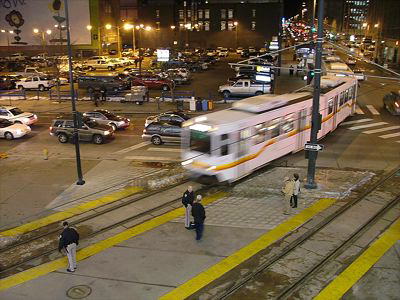No Light Rail in Vancouver!
RTD to Raise Transit Fares

In 2004, Denver’s Regional Transit District (RTD) convinced voters to increase the
sales tax dedicated to transit from 0.6 to 1.0 cents per dollar so that it could
build six new rail lines. Now it says tax revenues are falling short of projections,
while costs are higher than expected. So it is raising transit fares, which will
only reduce ridership and harm transit-
This is a completely predictable result of trying to build a rail megaproject. It
is one thing to run a bus system where the capital costs are low and don’t require
either long-

Blocking traffic.
Flickr photo by Jeffrey Beall.
Such planning requires accurate forecasts of future costs and predictable flows of future tax revenues. Neither are possible. Planners almost always underestimate costs. Revenues always fluctuate with economic cycles, which are unpredictable and so planners fail to include them in their cost and revenue forecasts. When the crunch comes, the transit agencies do the only things they can do to control their revenues and costs: first they raise fares, then they cut service.
Denver’s RTD is publicly blaming increased fuel prices. Gee whiz, who could have predicted that in 2004? It is not as if gasoline prices had ever increased before then.
But RTD also admits that its sales tax revenues are also below projections. Who could have predicted that in 2004? That’s right, I did — and it was fairly obvious because the projections had been made early in a recession that wasn’t built into those projections. But at the time, RTD denied that there could be anything wrong with its projection that tax revenues would increase by 6 percent per year forever.
Like someone buying a house that costs more than they can really afford, when transit agencies embark on rail projects they are betting that they can complete construction before an economic downturn or an unforeseen cost increase. This is bet they almost always lose, as we have seen in Los Angeles, Portland, Sacramento, San Jose, and many other cities. But when the agency loses the bet, only the taxpayers and transit riders, not the transit managers or board of directors. So they have no incentive to care.
Not all transit agencies are funded out of sales taxes, but for those that are, it
seems that a half-
Moral: For the sake of your transit service, keep your local transit agency hungry.
9
Trackback • Posted in News commentary, Transportation
Reprinted from The Antiplanner